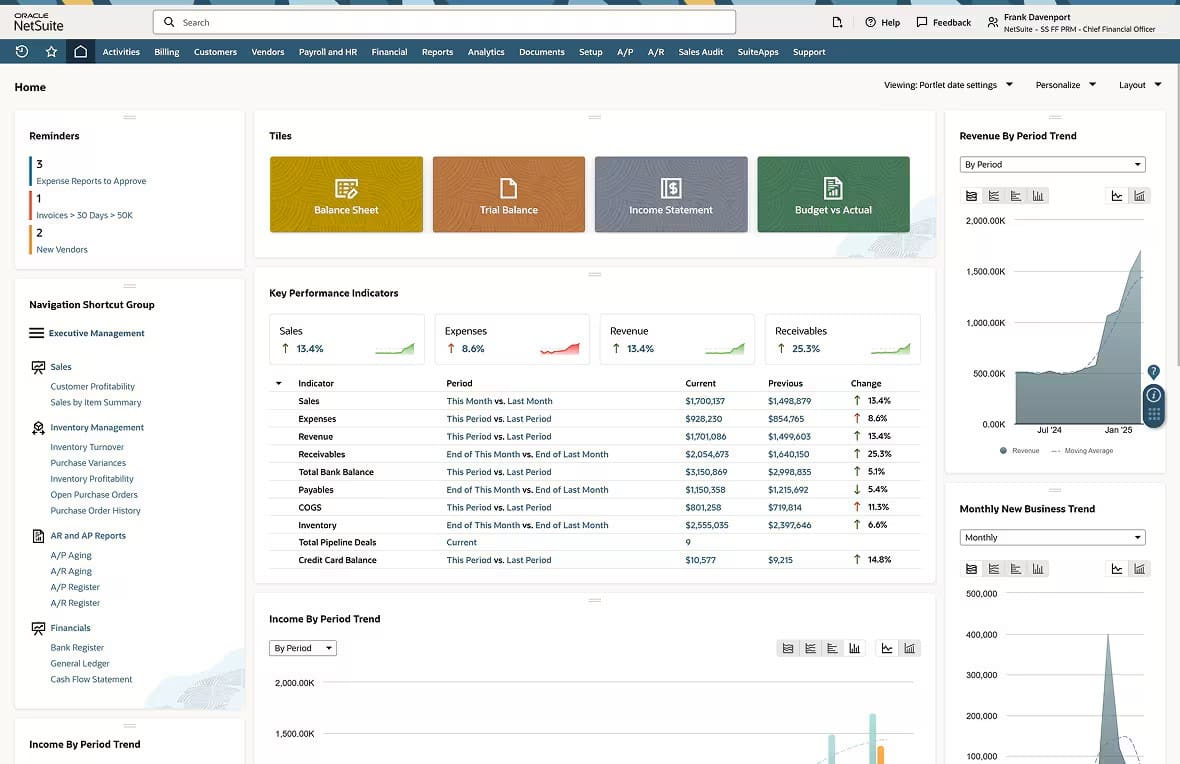General-purpose generative AI chatbots have their place. For businesses, though, the real GenAI revolution is about data and context. With AI weaved into its code, your ERP goes beyond being the org’s system of record. It becomes a partner that’s incredibly attuned to your business—flagging upsell opportunities, forecasting cash flow, finding better ways to serve customers, and generally using your live financial and operational data to spot problems and recommend solutions before you even know trouble’s brewing.
On top of that, your ERP is getting much better at automating both routine tasks and complex processes that require deeper reasoning, while showing you the chain of logic, not just the outcome. By embedding AI in the system your teams use every day, suddenly tasks and workflows are automated, jobs are more creative and data driven, and time is available to collaborate. Here’s how that works.
What Is AI in ERP?
AI in ERP refers to the integration of artificial intelligence (AI) technologies, including machine learning and generative AI, into enterprise resource planning systems. Because comprehensive ERP software underpins a range of business processes, including in finance, supply chain, human resources, and operations, embedding AI means it’s now built into workflows, data-informed, and ubiquitous across the organization.
Finance can go from hunting errors to having anomalies flagged with fixes as they happen, while in sales and operations, instead of customers silently churning and supply chain glitches landing without warning, teams get early alerts with context summaries that help them get ahead of problems.
Key Takeaways
- AI-enabled ERP systems can proactively surface insights, personalize user experiences, and trigger automated actions in line with their roles and permissions.
- Predictive analytics engines are key to accurate demand forecasting, cash flow predictions, and risk management.
- When adopting AI in ERP, best practices are aligned with tailoring the effort to your organization’s specific priorities.
- Agents are a key AI benefit—think a QA analyst agent that continuously monitors returns, return authorizations, and communications from customers.
AI in ERP Explained
To embed AI in ERP, software providers integrate generative AI and machine learning models directly into the system’s core processes and user interfaces. For well-established ERPs like NetSuite, that requires plugging complex new tech into a mature, widely adopted platform without disrupting existing operations. Established data structures, customizations, workflows, and security mechanisms must work as they always did even as AI-enhanced features are added. Once it’s integrated, however, AI enables ERPs to process data in real time, delivers new capabilities like AI agents and predictive analytics, and supports complex decision-making across the organization.
In practice, AI features are woven into ERP workflows: Natural language processing (NLP) lets users interact with the system through written or spoken commands to generative AI chatbots, making data retrieval and analysis more accessible. Meanwhile, predictive analytics and anomaly detection tools continuously monitor operations including financial transactions, supply chain activities, or employee performance to identify irregularities or forecast outcomes.
By infusing AI right at the system level, your ERP can now proactively surface insights, personalize user experiences, and trigger automated actions in line with its roles and permissions. And it all happens within the workflows your team already uses, lowering the bar to adopting AI.
Types of AI Technologies in ERP
ERP providers are working to infuse AI across their suites to help customers achieve the highest possible levels of efficiency, accuracy, and agility in a range of business functions.
Specific technologies that underpin AI in ERP include:
Object recognition/document understanding
Data integration and ETL tools
Natural language processing (NLP)
Robotic process automation (RPA)
- Agentic AI that can automate complex workflows, like developing proposals, preparing vendor selection criteria, compiling reconciliations, and tracking and adjusting supply chain operations. AI agents can be deployed across the ERP and can work on their tasks autonomously or have humans approve key decisions.
- Anomaly detection within ERP systems is a particularly useful machine learning technique for monitoring and maintaining the integrity of financial transactions, operational processes, and supply chain logistics by swiftly identifying irregularities that could indicate fraud, errors, or inefficiencies. For example, it can help detect fraud in financial operations, identify quality control issues in manufacturing processes, and immediately recognize supply chain disruptions.
- Cloud-based AI services provide high-performance inferencing and data analysis from advanced data centers. Given AI’s compute-intensive nature and pace of change, cloud-based ERP systems deliver better AI functionality and performance than on-premises systems. Cloud providers deliver regular software updates, have access to the latest hardware and expertise, and can adapt to quickly embed new advanced capabilities.
- Object recognition/document understanding is key for moving data—think paper forms like receipts and invoices—from the physical world to digital representations. It validates and classifies a wide range of sources, including invoices, contracts, receipts, PDFs, policy manuals, training guides, customer testimonials, and purchase orders. Now the ERP can read, interpret, and act on that knowledge.
- Data integration and ETL tools prepare and cleanse data from various sources to create data warehouses, which AI models can then access via technologies like retrieval-augmented generation, or RAG. For example, RAG can enable natural language Q&As within ERP systems. AI understands and can search by contextual meaning, providing superior query responses that consider policies, financial records, customer interactions, and supplier information. For example, a marketer might ask, “What was our top-selling product in Q2?” The RAG system retrieves sales reports from the ERP, analyzes the data, and then generates a clear natural language answer, chart, or table.
- Machine learning is a branch of AI that is particularly good at analyzing very large data sets and then noticing when new data deviates from the discovered patterns. It’s used for scenario planning, forecasting, fraud and anomaly detection, and other data processing tasks. Machine learning has run in business systems for years and often gets better as it trains on more and more historical sales, financial, supply chain, and other data. The big difference now is that LLMs can summarize the findings of ML systems in real time and, often, make recommendations on actions that should be taken when new anomalies are found.
- Model Context Protocol, or MCP, is a defined standard that lets different AI agents, services, or models share information in a consistent and controlled way, so that responses are relevant for the desired output. MCP is implemented as a server, and the AI systems that use it are clients. MCP requires the use of secure REST APIs, for authentication and authorization, to help protect against data misuse. It’s highly useful for teams working with complex or sensitive information.
- Natural language processing (NLP) is a key capability of chatbots, voice assistants, and natural language queries within the ERP. NLP shines because people can use natural language assistants to search, navigate, analyze, and act across the ERP using their own words. When they can simply ask questions or issue commands, they’re more likely to take advantage of the full feature set of an ERP system, and of relevant data.
- Predictive analytics engines, sometimes referred to as predictive modeling, support demand forecasting, cash flow predictions, and risk management by analyzing trends and patterns. Paired with NLP queries, teams can get context-aware answers, visualizations, interactive content, and reasoning that explains the “why” behind predictions and recommendations.
- Recommendation engines provide tailored, optimal next steps through personalized dashboards or suggested actions, adapting their responses to the user’s role, current task, and past activity.
- Robotic process automation (RPA) automates repetitive, rule-based tasks such as data migration and document processing. While not driven by AI, RPA capabilities can be used by AI to go beyond recommendations and execute workflows as allowed by the organization.
These technologies work together to deliver intelligent automation, advanced analytics, and user-friendly AI features within advanced ERP systems.
How AI Is Improving ERP
On a practical level, AI is improving ERP by automating tasks, generating predictive insights, and personalizing user experiences. This all leads to greater operational efficiency, more informed and proactive decision-making, and the ability to adapt quickly to changing business conditions.
But AI also gets at the age-old ERP problem of complexity, which can lead to employees not getting the full benefit of the system. By embedding intelligent features right into core ERP processes and, importantly, making them easy to use via agents and natural language interactions, companies should see continuous process improvements directly related to better uptake of the software.
AI Everywhere: How NetSuite’s Unique Approach Gives Customers an Advantage
How Is AI Transforming ERP? 7 Use Cases of AI in ERP
What began with simple process automation has advanced considerably, with technologies like predictive analytics speeding up decision-making and NLP fueling operational efficiency. Here’s where AI-integrated ERP systems are having the greatest impact.
-
Deep data analysis
AI capabilities let ERP systems uncover insights that would be challenging, if not impossible, for humans to identify manually. Fueled by data mining and predictive analytics, ERP systems leverage AI to analyze historical data and identify patterns, trends, and correlations that help forecast market behaviors and optimize resource allocation.
-
Personalized experiences
AI in ERP systems can help companies tailor interactions and services to individual preferences and behaviors, up-leveling both customer and employee engagement. For customers, this could mean personalized product recommendations based on past purchases or browsing behavior. For employees, it might result in a customized dashboard that prioritizes tasks and information according to roles and work patterns.
-
Enhanced customer service
Advanced ERP systems are redefining the way companies interact with customers by adding greater responsiveness, personalization, and efficiency. RPA-powered chatbots, for example, can handle a wide range of customer service inquiries in real time, from tracking order status to resolving common issues like billing discrepancies. This speeds response times and frees customer service representatives to focus on more complex queries.
-
Improved forecasting
AI can identify patterns that human analysts might overlook. As a result, ERP systems can more accurately predict market trends, customer behavior, and supply chain disruptions. Better forecasts help businesses achieve higher levels of operational efficiency by more closely matching supply with demand, allocating resources more effectively, and capitalizing on market opportunities.
-
Optimized supply chains
AI capabilities in ERP systems make it possible for companies to analyze and interpret supply chain data in real time with the goal of anticipating disruptions and improving procurement processes. By predicting spikes or lulls in demand, companies can adjust production schedules accordingly. Optimized supply chains also contribute to stronger supplier relationships and better customer satisfaction by providing faster, more accurate order fulfillment.
-
Risk management
Deftly navigating various risks—ranging from operational to financial, supply chain, and compliance—plays a critical role in a company’s success and longevity. Incorporating AI within risk management strengthens resilience and helps capitalize on opportunities with a clear understanding of the landscape. Companies can shift from reactive to proactive, foresee and mitigate risks before they escalate, safeguard assets, and maintain continuity of operations.
-
Continual improvement
AI allows ERP systems to process and learn from both structured and unstructured data and predict outcomes with increasing precision. For example, an ERP system with AI capabilities might continuously analyze operational data to identify inefficiencies and suggest improvements, which helps improve agility and responsiveness to market changes, increase operational efficiency, and, ultimately, speed up innovation.
Benefits of AI in ERP
The AI we see in public chatbots is a generalist; it knows publicly available information, mostly from the internet. The AI inside an ERP can go much further; it knows about your business because it knows your data. This is the crucial difference—AI that has access to your company’s real-time financial, inventory, and sales data can successfully automate complex tasks and provide useful insights. And since AI is integrated into your ERP, the data analyzed is limited by the roles of each team member.
There are four major categories of benefit from AI:
- Automation: AI together with RPA can automate many routine, process-based tasks, like invoice payments and order entry, freeing employees from that rote work while reducing errors. AI agents take automation a step further by automating tasks that require reasoning to complete. They can use tools like RPA processes, APIs, and other agents, and they tend to improve over time by tracking previous outcomes, identifying inefficiencies, and finding ways to deliver better results.
- Insights and analytics: AI-powered ERPs analyze massive volumes of data to uncover trends, provide forecasts, and help with proactive decision-making. For example, predicting increased demand or flagging potential supply chain disruptions can be the difference between keeping popular, profitable items in stock versus having customers shop with competitors. In many cases, AI-enhanced ERP systems can access and use third-party data to recognize outside influences that might affect your business.
- Natural language processing: Top ERPs use AI to let users interact with the system using plain language queries and commands, making masses of complex data more accessible. And the more teams interact with the system, the better it gets at understanding what’s important to that group.
- Personalization and recommendations: Related, AI can tailor dashboards, reports, and workflows to individual people or roles based on historical behavior and business context.
Challenges of AI in ERP
Overall, AI in ERP aims to make operations more efficient, data-driven, and responsive to changing business conditions. But adoption isn’t without its bumps. Five top challenges that companies should look out for when evaluating providers are:
- Data quality and integration: AI relies on accurate, consistent data from multiple sources. Integrating disparate systems and delivering high-quality data can be difficult, especially in organizations with legacy or siloed environments. Look for an ERP provider that offers a unified cloud-based platform with robust integration capabilities: A comprehensive cloud ERP centralizes business data and standardizes processes across departments, while a cloud integration platform offers a managed system that moves data between your ERP and other systems you use. This architecture helps break down data silos and simplifies integration, providing better input for AI applications.
- Change management and user adoption: Employees may resist adopting AI-driven features due to unfamiliarity or concerns about job impact. Successful implementation requires effective training and clear communication of the benefits. An ERP with an intuitive, user-friendly interface; in-product guidance and robust support resources; and a delivery model that allows for continuous updates and access to new features can deliver ongoing user training and maximize adoption.
- Security and compliance risks: AI models can access and process sensitive business data, raising concerns around data security, privacy, and meeting regulatory requirements—especially for organizations operating in multiple jurisdictions. An ERP platform that includes comprehensive security controls, such as encryption, role-based access, and audit trails, and that has the infrastructure to support compliance via data localization, is key.
- Customization and scalability: Aligning fast-changing AI capabilities with each company’s unique business processes and scaling them across diverse departments or global operations adds complexity. That’s especially true for highly specialized industries, like manufacturing or healthcare. Look for a platform that offers configurable workflows, role-based dashboards, and extensibility that lets organizations tailor AI functionalities to their business requirements. A cloud-based solution will likely be better able to scale to support organizations as they grow or expand globally.
- Cost and resource constraints: Implementing AI in on-premises ERP systems often demands significant investments in technology, skilled personnel, and ongoing maintenance, which may be challenging for some organizations to justify or sustain. Again, a cloud-based ERP reduces upfront investment and IT overhead.
AI in ERP Best Practices
When it comes to AI in ERP, best practices are about realizing the full value of the effort for your specific organization—in other words, prioritizing high-impact use cases, not AI for AI’s sake. Here are five places to start.
-
“Land and expand” use of AI
Often, AI help with your important business goals, like faster closes, better supply chain visibility, AI-driven demand forecasting, automating accounts payable and receivable processing, or doing predictive cash flow analysis. Choose a system where the embedded AI capabilities support your priorities, then sell it to teams based on business value for them. Expansion is easier when your ERP provider offers a marketplace of partner applications that you can easily integrate.
-
Establish human-in-the-loop (HITL) workflows
For the most critical and complex business processes within your ERP, AI should recommend, not decide—at least at first. Include human-in-the-loop approval steps, where an employee reviews and validates high-stakes proposed actions, like a large purchase order or a budget adjustment, before they are executed. This maintains control and builds trust in the AI.
-
Encourage AI skills development
Provide ongoing training, share success stories, and cultivate champions to maximize use of the system. That’s easier when the ERP is a natural extension of your operations, people feel that every insight and action is trustworthy, and there’s ongoing education available from your provider. Train power users to configure AI features to fit your company’s data and specific use cases by, for instance, building agents using low- or no-code tools, adjusting thresholds, selecting which data fields to analyze, and providing feedback to help the system improve over time. Look for platforms that provide an AI agent studio for creating bespoke agents to meet unique needs.
-
Invest in data quality and completeness
Like any ERP, an AI ERP is only as good as the data it has to work with. The primary value of an AI-enabled ERP is that it has access to your company’s core financial and operational data, which is in an expected format. The challenge comes when integrating data from outside sources, like an ecommerce site or a point-of-sale system. Cloud-based integration platforms are a good way to keep these integrations working smoothly, and they’re worth the effort because when the AI’s insights are on point, teams are invested.
-
Report on ROI and business impact
Use built-in analytics to track productivity gains, error reductions, and other key performance indicators, tying improvements directly to investment decisions. One area to watch? Collaboration. Are individuals and teams getting together to use a wide range of data to analyze problems, brainstorm solutions, and develop cross-department agentic workflows? That’s one way AI in ERP can really pay off, particularly when teams can use natural language to find new trends in data.
A throughline here is to focus on augmentation, not just automation. The biggest win may not be offloading tasks but amplifying your team’s intuition. You get there by encouraging employees to use AI as a collaborator, having it execute a task like invoice matching 90% of the time, freeing people to spend their time on the 10% that requires critical thinking, like analyzing exceptions or strategic vendor management.
Ready to Take Advantage of AI in ERP? Check Out NetSuite
NetSuite’s approach to AI in its ERP focuses on automating processes, providing actionable insights, and making user interactions conversational. AI capabilities are natively embedded into many of NetSuite’s integrated modules, so companies can apply advanced analytics, predictive insights, and automation features to simplify a wide range of tasks, including financial reconciliations and customer-service inquiries. NetSuite ERP’s recent releases included three new AI-powered tools—addressing text generation, capture of invoice information while eliminating manual data entry, and automation of data analysis in planning and budgeting. Financial exception management is also now available.
With NetSuite’s AI-driven analytics, customers can proactively overcome challenges and capitalize on opportunities.
NetSuite’s ERP Dashboard

With many AI technologies, the more they’re used, the more they improve. That bodes well for the future of data-rich systems like ERP solutions, which will continue to harness AI to not only automate increasingly complex tasks but also mine data for richer insights that fuel better decisions.
AI in ERP FAQs
How is AI used in ERP?
Enterprise resource planning (ERP) systems use artificial intelligence (AI) to enhance decision-making, automate routine tasks, and provide predictive analytics. AI helps companies build real-time insights into business operations, optimize supply chains by forecasting demand accurately, and improve customer service through technologies like intelligent chatbots and virtual assistants that can leverage unique data on each customer. AI-driven ERP systems can also detect anomalies in data to help prevent fraud and meet compliance standards.
Can AI replace ERP?
No, artificial intelligence (AI) can’t replace enterprise resource planning (ERP) systems, but it can certainly enhance them. ERP systems serve as the backbone of enterprise operations, integrating core business processes, such as finance, human resources, and supply chain management, while AI acts as a powerful layer that optimizes these processes. AI adds intelligence to traditional ERP functions, automating tasks, and providing insights that improve decision-making and operational efficiency. Together, AI and ERP create a more advanced, efficient, and intelligent system for managing business operations.
Can ERP be automated?
Absolutely. Enterprise resource planning (ERP) systems can be significantly automated using artificial intelligence (AI) technologies, such as robotic process automation (RPA) and machine learning (ML). These technologies can automate repetitive tasks, including data entry, invoice processing, and report generation, to streamline efficiency and reduce the likelihood of human-generated errors. This not only speeds up business processes but also frees employees to focus on more strategic, value-added activities.
What is the relationship between ERP and business intelligence?
Enterprise resource planning (ERP) systems and business intelligence (BI) tools are complementary technologies. ERP systems collect and organize data from across an organization’s operations, serving as a comprehensive data repository. BI tools then analyze that data to provide actionable insights, trends, and patterns that support strategic decision-making. Integrating BI with ERP systems enhances the value of the data collected by ERP systems and provides the foundation for sound decisions based on real-time information.








